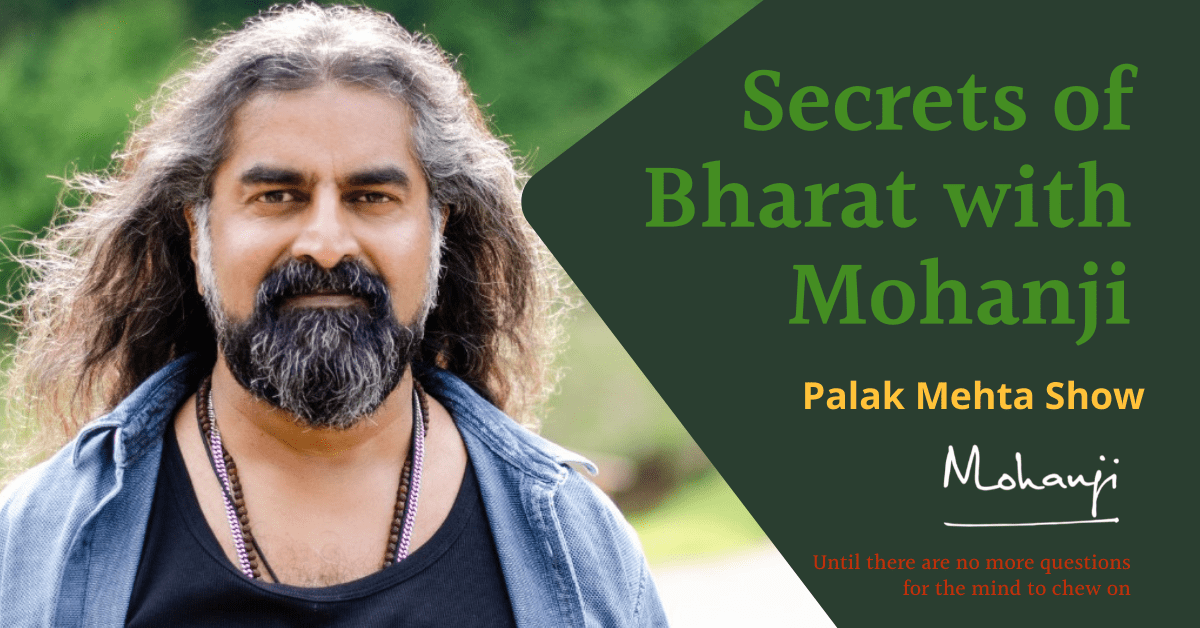Mohanji On Saints And The Secrets Of Bharat I Palak Mehta Show
Host: Many call him a humanitarian, some call him a Guru, and some call him a mirror. But I call Him a force – a force of infinite, undeniable brightness. He’s changed millions of lives globally, and I’ve connected to him in my way for over a decade now. We’re talking about Mohanji, who is a living expression of Sanatan Dharma. He’s dedicated his life to serving the world. I’ve noticed that Mohanji’s presence itself transforms people only if you let it.
Now birds, animals, and people from various countries, various religions, and so many spiritual masters are very fond of him. He often says the world is one family, and he completely personifies that.
Today we talk to Mohanji and dive deep into his journey with other masters, His take on Bharat, and His secrets of India.
I’m your host, Palak, and you’re watching me on the Palak Mehta Show on the Secrets of India channel.
Namaste, Mohanji.
Thank You so much. We are very honoured to have you here.
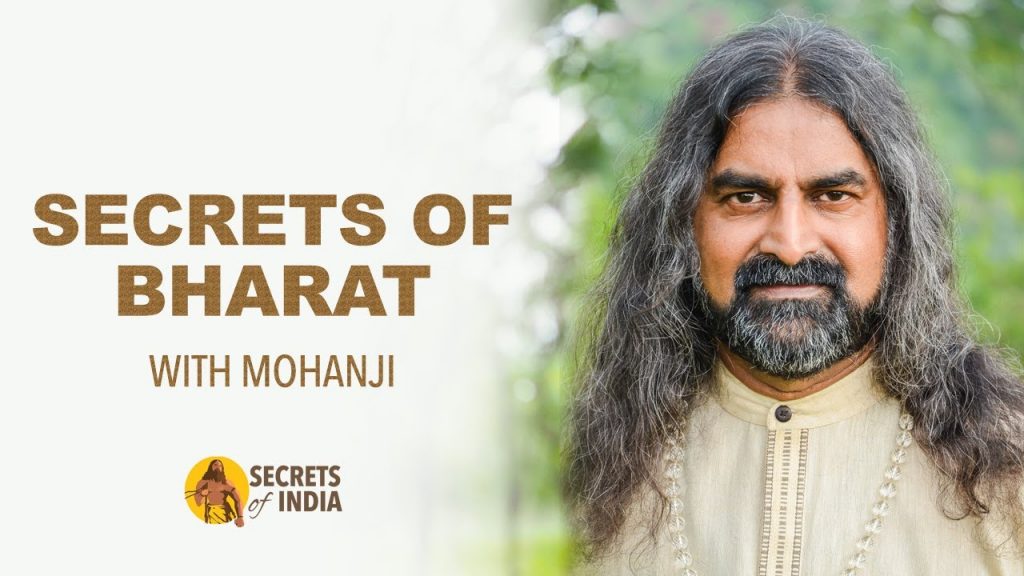
My first question to you is:
What, according to you, is the secret of Bharat?
Mohanji: The secret of India is very difficult to explain. I would rather say: “Every pebble in India has a secret to tell.” The real India is secret or sacred, very deep, and the height of depth of liberation. Every stone talks about liberation; ‘Moksha’, liberation. This is embedded, or it’s the source and soul of every pebble of India.
The real India is ‘Spiritual India’ (which is not just spiritual); it’s really transformative and liberation-oriented. Every aspect of Bharat (I would like to call Bharat ‘bhava-raga–tala’) has a vibration, just like our body. We have various vibrations, various frequencies, like a medley, like harmony synchronised together to create a great harmony, which we call ‘health’, ‘wellbeing’. Just like that, the harmony of life is built into the soil of Bharat.
The mountains and the oceans, and the rivers all are sacred. Everything is sacred, and great masters who have dug deep into themselves and discovered great philosophical heights, like Everest (even greater than Everest), great things came out of their meditations, their contemplations, and they produced it. And even if we even take one path called Ayurveda (it’s a Vedanga, a limb of the Vedas), they did not create this by dissecting animals or killing millions of animals.
They went to the source, and they found this from the source. They brought it out of the source. That is why they said: “Everything a human being needs is in the world; the world has provided it”. All you have to do is have eyes to see it, recognise it, accept it and adapt to it. Everything is provided. We do not have to disturb any living being for our sake. This is the greatness of Bharat.
Host: That is so deep.
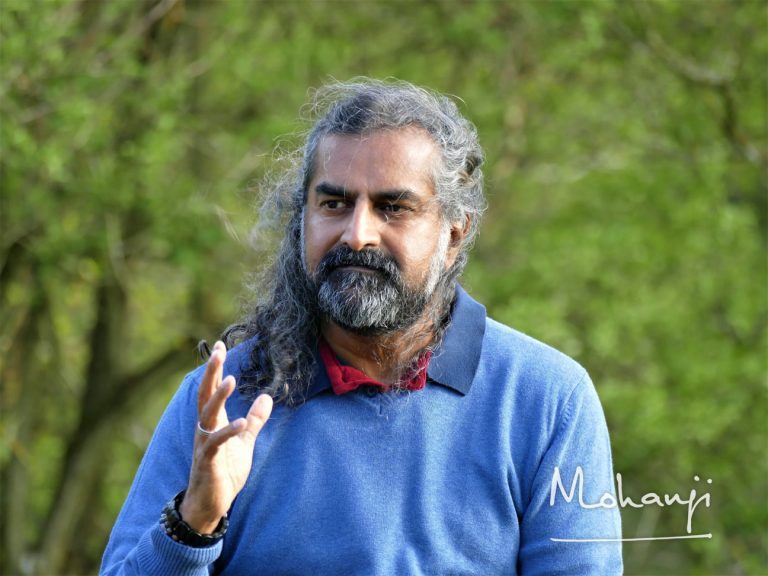
So how is Bharat relevant to the world now?
Mohanji: When I think about Bharat or when I represent Bharat; I always feel that I’m representing myself. All of us have the whole Bharat within us. It’s not about religion; it’s not about caste, country, culture or any of this habitual stuff or anything; any rituals or habits. It’s the vibration of liberation within us. The deep urge for liberation has brought many people to Bharat. A Lot of people came here. Great masters guide them, still.
When you talk about: Buddha, Krishna, Rama – we talk about the various great masters: Babaji and the tradition of kriya, great Siddhas like Agastya, Boganathar and that Lineage – then the powerful masters like Ramana Maharshi and those kinds of masters (who have excelled in their methods and paths), if you just look at these average number of masters here, look at them, they have all been extraordinary.
Nobody can be compared to another; each person is unique. Even if you take the Avatars of Maha Vishnu, they are all distinct and unique. Hanumanji is unique. You look at every aspect of our guides. (I would like to call them guides because they all represent certain ideals.) So, these guides are really powerful. They are well established in their tradition and path, and that’s kind of transmitted further to the next generations. We have a great depth, even the living Masters today. There are numerous masters who have found themselves.
Tat Tvam Asi – ‘You are That’ – what you are looking for.
The highest thing you can do is to find yourself; beyond the body, mind, intellect, ego and all of that, you find your true sense; the electricity within you, the energy within you, the ‘Atma Tattwa’, the principle called ‘Soul’ within you. When you find that; you’ve found everything. There’s nothing more to find. So, this has happened to numerous people up to this point in time. We are not bound by any kind of frame. There are no frames here.
You are the path; you are the journey; you are the liberation. So, Tat Tvam Asi – You are what you are looking for. You are That. This kind of deep philosophy – which is quite liberating; unbinding, no bondage, no restriction, no kind of rigidity, no heaven or hell outside of you – this kind of path is really suitable for human beings because this makes them understand themselves. We are not trying to understand somebody’s philosophy; we’re trying to understand ourselves. We are the philosophy. We are the journey; we are the destination. We are Liberation. We are walking liberation. The great thesis works about self-realisation, realising what is already sitting in you.
Soul gives life to the body and every aspect of the body.
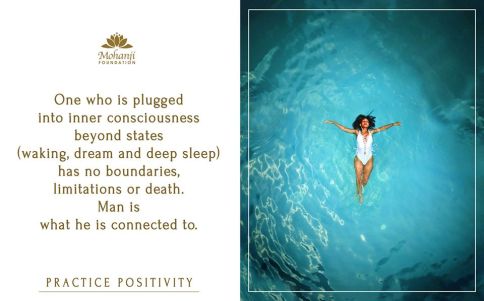
Self-realisation
At a certain point in time, when the mind becomes quiet from thoughts, thoughts are not bothering the mind, a stillness settles in, and at that time you realise there is a huge power and electricity which is making this whole body function (body is just like a cage).
But there is an indweller, somebody living inside. That living being is making everything alive. Like for example, we have a house, and if there’s no one living in the house, the house is empty and void. But when people start living in the house, there’s life in the house. Just like that, the soul enters the body. It gives life to the body. It gives life to every aspect of the body. Then when we start connecting to the soul (which is giving life to every aspect of the body), we become self-realised.
Then we see the same in every being around us. We become God-realised (which means we see the spark of God through numerous beings). All these beings are our own reflection.
There is no room for fear
We are a unit. They are units. When all these units come together, we become the macrocosm, the whole universe. So we get to know these things by connecting to ourselves. (Without connecting to ourselves, we cannot understand.) We never, ever believe in fears; we have no fears. Fears bind you. Fears are the major boundaries of our mind. When fears are taken away, the mind opens up. We become fearless because there’s no room for fear. There is nothing to be afraid of. No God is sitting out there, looking at you and waiting to punish you. The energy of God is within you.
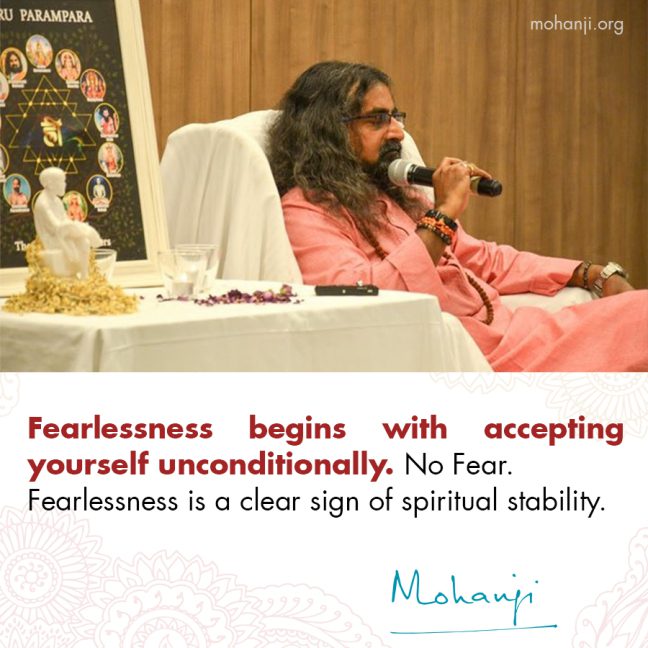
Nurture that energy, become selfless, become compassionate, be kind, become everything (means you accept everything around you and inside you). Through acceptance, you become one with everything. Then you become one with God. You can only love God; you cannot fear God. There’s no room for fear. So, when fear is taken away from the mind, the mind becomes free. We start experiencing freedom. Where will you find this philosophy? Bharat has this great treasury.
This is why the whole world should be proud of Bharat. This is not only for the people who are born here. This is so rich. It’s available for all the people of the world, telling them to find themselves, giving them methods.
Host: I have never thought of it this way, Mohanji.
What were some of these methods?
Mohanji: They gave the methods of ‘Swara’, breath. Through the breath, you can find yourself; through your heartbeat, you can find yourself. Catch hold of something which is already within you and find yourself. And when you find yourself, you have found everything. All that you’re looking for is there.
What do you see outside? To fulfil your aspirations and your desires, there are materials outside, so that you can realise – so that you can understand: there is ‘you’ and ‘another’.
What we are, we see outside
That means you can understand there is ‘you’ because there is another. Duality. That is why we have some separation, the idea of separation, the idea of the mind. Mind is an idea, and that unification happens within, when we start understanding ourselves completely, when we start assimilating and aligning with ourselves, outside is only our reflection (which is always there), but we start understanding that it’s only a reflection. When we become angry, we see anger in the world outside, just like a mirror. When we are happy, we see happiness outside. When we love, we see love outside. What we are, we see outside. So, where are we? We are inside, and we are outside.
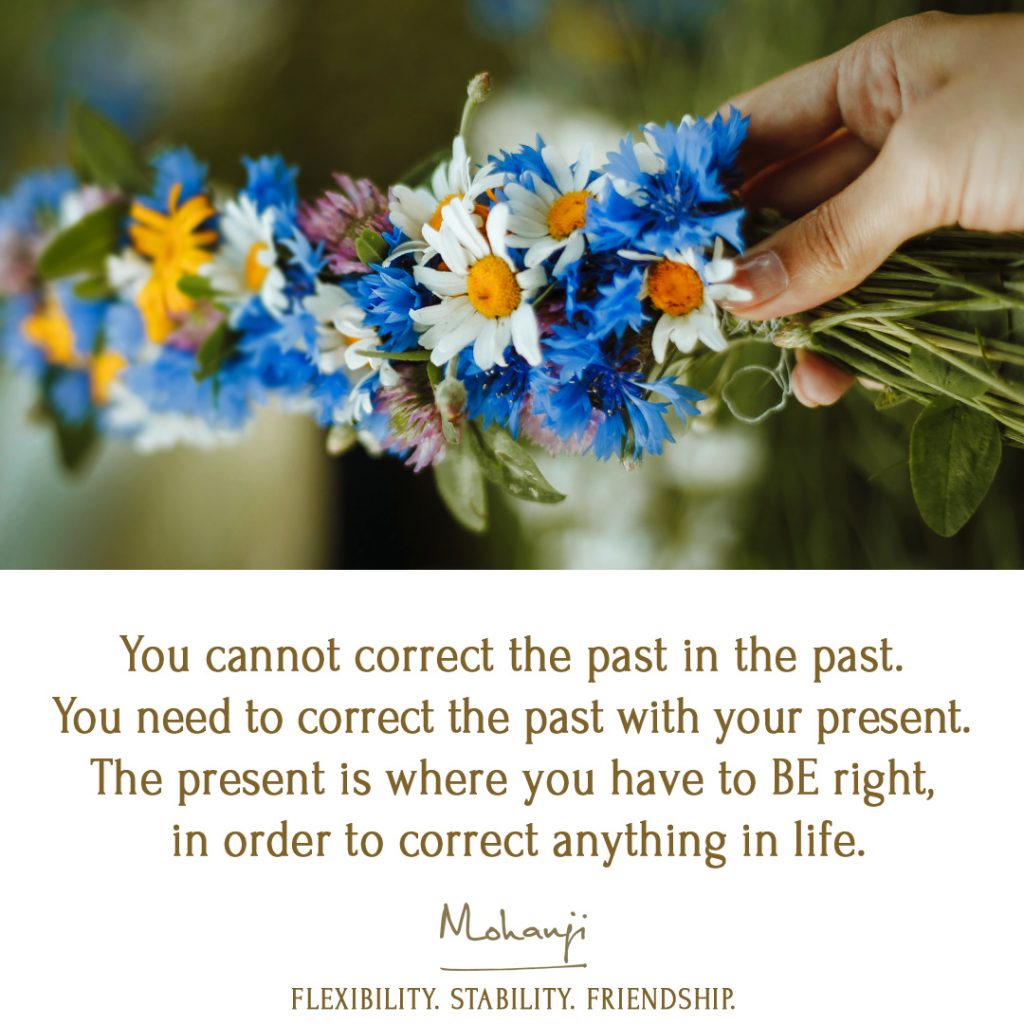
Everything is us. That is why I said: “Bharat is not this land; Bharat is everywhere“. This philosophy is nurtured and cultivated and brought to a certain level so that the old world can feast from it. We have got to be proud of Bharat. This depth you will not see anywhere. It is in every sand, every sand piece, a particle or soil or pebble of Bharat. This is written. If we have eyes to see, we will see that. And that’s enough for us to transform. Just to know. Remove the caste, culture, country, boundaries. Remove all the barriers that man created, man-made barriers. Remove all that and see. You will see the beauty and the depth of Oneness.
Host: India has given us the gift of finding your true self in the whole world. There is just so much to know about it.
Mohanji: About Bharat, I can explain more and more like this because I only see the wonder of Bharat. See, I cannot claim that I know Bharat. I do not. I don’t think anybody knows Bharat because we have only seen the people, culture, cultural differences, or invaders – those who came and conquered Bharat – took things away from here, material things, and they became rich. Then we see the force of poverty here. There was a time when there was no poverty.
The power of a ‘Temple Culture’
Host: Could you please tell us a little bit more about that time?
Mohanji: We had a temple culture, which means a temple with the ‘Prana Pratishta’ – a presiding deity as the chief of the village. That deity was the main ruler of the village, and other rulers ruled as servants of this deity. All the wealth and all the things came to the temple, and the temple distributed it. So, there was nobody poor, a beautiful system.
The temple had its own property and land and had all facilities and faculties; it was a training ground; they used to train people in Vedic and philosophy; Upanishads, Vedas, Scriptures, Puranas – all those things were trained or imparted in the temples, free of cost. And those who liked to learn them came here. They listened to it, they understood it, and they imparted it further. So, there was stability.
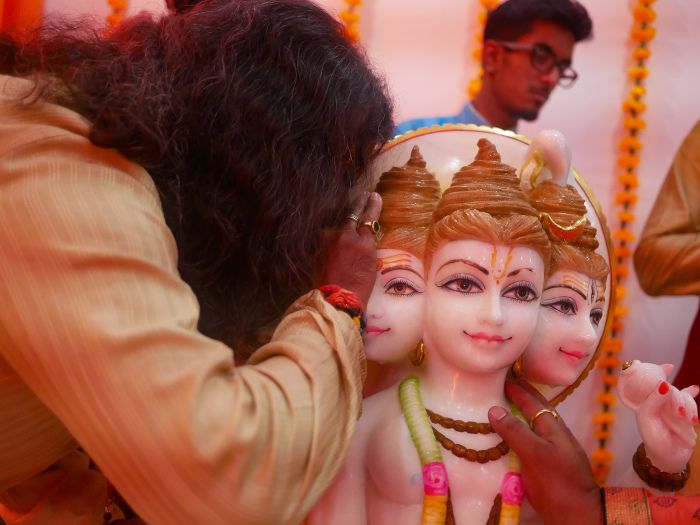
The flow of karma was well defined through the scriptures, and the consequences of karma were defined, well defined. It is still well defined, but there is no proper training going on about this (unless in small pockets), but it was everywhere. Everywhere, this temple culture was beautiful. There was no conversion; there was nothing to change—no need to change people into anything. Food was provided in the temples – anybody hungry coming to the temple gets food – and the presiding deity gives energy and power.
Wealth was distributed; physical, medical aid was given from temples, everything was available in temples. If this culture comes back to Bharat, Bharat will excel in everything, and it should come back. The temple culture should come back, where the temple actually provides for the people. And all the people who are rulers should be servants of the temple – servants in a sense, serving for the temple – for the well-being of the whole nation—not harming any being on Earth—not harming anybody or any being. This culture should go all over.
There is no possessiveness. There is no overwhelming importance of possessions. Everybody is fine, everybody’s happy, everybody’s rich inside. Everybody gets food to eat. They have clothing and shelter; basics are provided. Medical care is provided, education is provided, free of cost. What do you need then? Then you have great awareness that you are all aiming for, ‘Moksha, ‘Liberation’.
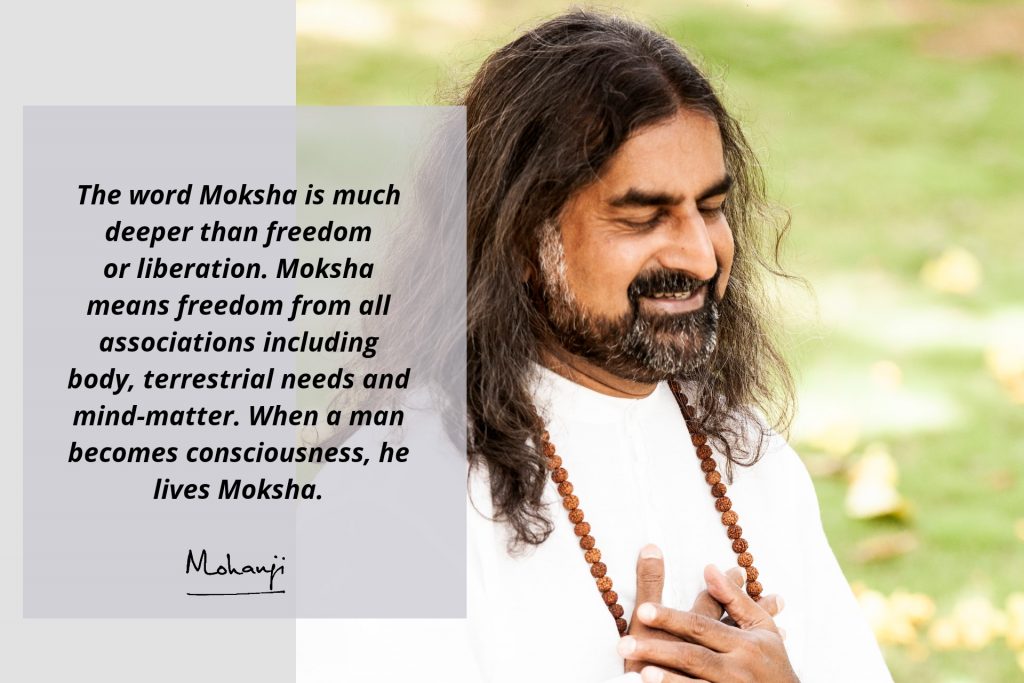
The great blessing of ‘Moksha!’
How to reach there – Bhakti yoga, Gyana yoga, Karma yoga, Raja yoga – various paths as per your orientation, as per your inclination. Beautiful! Amazing! So, because this kind of culture has existed here, it’s our duty now to revive it. Bring it back. There is no room for competition here. There’s no room for fear here. It’s hardcore justice. Justice means every being should have equal facilities. All things provided. All are equal; respect life.
We respect life, and we don’t have to kill any being for our sake, for our survival. Instead, we nurture, and we survive. We stay alive, so we can keep others alive. We survive; we keep others alive. Like that, we can mould this whole thing back to the old ways. We had that system, before, here.
Host: Mohanji, why do you think that the temple culture is lost now? Is it because the government has private control over some temples?
Mohanji: Well, it’s a long story; it’s not new. For the last few centuries, the temples are occupied by the government – actually speaking, I think at least 800, or 900 years onwards, there have been invasions into India. These invaders came with a different philosophy. The main thing is that when an invader comes with a different philosophy, he is eager to cultivate his philosophy on this land.
One other thing is to destroy or dissolve the existing icons or the strongholds of this philosophy, which are temples. Numerous people came to loot temples from here. The temples used to be very rich because they used to be the distribution points. They came to destroy or loot from the temples, and thus they tried to destroy and disintegrate this whole setup. To destroy the setup.
Temple culture and invaders
Secondly, forced conversions to their philosophy, their religion. So what happens then is that you create certain different segments within this community, with the whole clan. So, there are conversions with people following a certain other philosophy, and that becomes a competition – so, what I believe in and what you believe in are different, so we can fight. Then, later on, the elected government started coming, and all these temples were controlled by rulers by that time.
Earlier, it was supported by rulers. Later, it was controlled by rulers. (Controlled by rulers means that the rulers own it.) All the wealth coming into the temple is absorbed into the coffers of the state. What happens then is that vested interest comes; “I like you, so I give you more”, “I don’t like you, so I give you nothing “. So, this happens when the state interferes.
Temples did not do that – temple; the presiding deity, distribution, it was perfect – “You’re hungry? Okay, you get food. You don’t have clothes? Okay, you get clothes.” Like that. But the state does not look at it like that – “Are you supporting me? I support you.” If you don’t – “if you’re not following my religion or my path – you won’t get anything.”
Discrimination, selfish purpose
So, this discrimination started and was further aggravated when political parties came in (there are political philosophies equal to religion – dogmatic – it’s like a dictatorial attitude.) So, they came, and they didn’t have any connection to the temples; they like the money from the temples, and they take it away and use it for political reasons or political purposes – usually selfish purposes. What happened was: the temple culture completely got destroyed by the invaders, then the local people and local politicians.
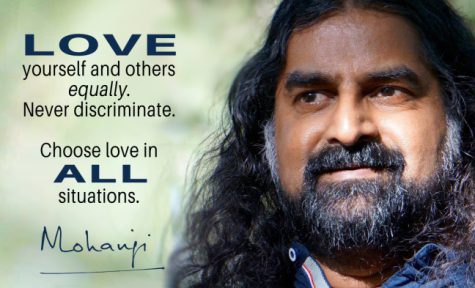
So, the temples with all the land, the wealth, the property, the culture, it got disintegrated. Now, the temples do not have that property; it’s just become a worshipping place, a place of worship, there’s no philosophy, no Sanatan Dharma taught. People do not know why they have to go to temples. There’s no education happening. There’s no healthcare support. There are no food supplies. (Some temples do have a food supply, but mostly they don’t.) And no clothes distribution. “Then why should I go to temples?” So, there was no connection. This political life – or the democracy that was brought – (I’m not against democracy), but democracy needs maturity. To have good democracy, you need extreme maturity.
Politicians should have a mindset to serve, not to exploit. So, that’s the difference here; the exploitation is more. What possibility is there from the temples? (Temples had numerous lands) now, where are all those lands? They’re all with these private parties, all distributed to different religions, and to appease people; to appease parties, appease religious leaders or various segments. That is how it is distributed.
If it is all brought back and everybody gets food to eat, clothing, shelter – I do not believe in the religious classification, I look at hunger – “Are you hungry? You must have food”. “Are you cold? You should have clothes”. This is how I look at life, which means looking at the actual needs of a person. This was the broad perspective of every temple. So, over a long time, what happened is that this temple culture became completely eradicated or eroded. Then what remains is an ‘option’. You can go to the temple if you’d like to go to the temple. Otherwise, nobody cares.
This led to more and more conversions and different religions and all those kinds of things; it’s a vicious cycle. So, in the bargain, people lost an understanding of the real India, real Bharat, the ‘Sacred India’. We lost the grip on sacred India. The ‘Sacred India’ is a justified India, where all people are the same, all are equal, treated well. There have been contaminations and aberrations at times, but that’s normal with human minds. But again, it’s not been totally eroded.
We have to bring back the culture where everybody, all the people, 1.3 billion people of Bharat have to be taken care of equally, irrespective of caste, culture, colour. Because everybody deserves to have a balanced life – this temple culture can bring that back. A high level of maturity is needed – where management has no vested interest – “I like you, so I give you more”, that should not exist. Serving everybody – it’s a service to the world, a service to the country.
Politicians should also be organised or educated in such a way that if they do selfish stuff, they should not be eligible to participate in elections.
If they engage in corruption, they are disqualified. Everybody has to have a system where there are rules, where righteousness is the main important thing. Honesty and selflessness are important.
Based on a Points System
‘Goodness factors’ should be nurtured from the school level and rewarded, like; a child has two pencils, he gives one pencil to a poor boy who doesn’t have one pencil. This is the ‘goodness factor’. That should be nurtured and rewarded and if rewarded properly, then that child will grow up knowing that there is a reward for goodness, not for corruption, not for cheating, stealing, comparing and competing. Not for that. No marks for that. But if you do good in your own way, within your own capacity, that’s rewarded. No fees to pay if you’re doing good things in school. No taxes as an adult if you’re doing good things in society. This means; basing this on a certain ‘points system’. (We can create that.)
So, based on points, we can create a ‘goodness factor’ as a benchmark for being a proper citizen of Bharat. (You see, 1.3 billion people believing and living in goodness, righteousness, how will society be?) We become unbeatable – no corruption, no competition, no greed. It’s: “What can I do for you? How can I serve you?”
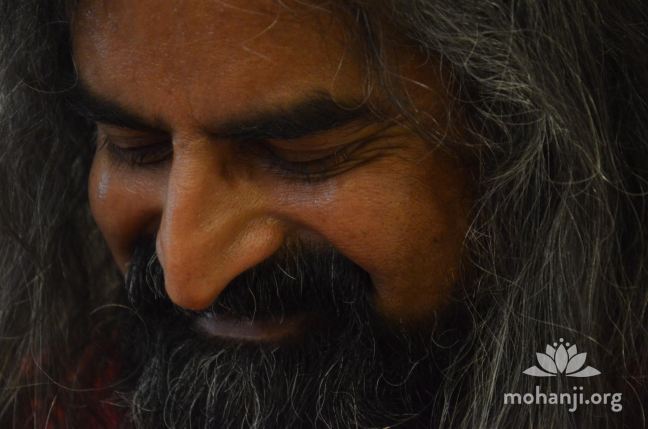
This is the real philosophy of Bharat. This is how we are. This is our nature. I strongly believe that this will happen very soon. At least, it should happen because we are fed up with corruption, favouritism, nepotism. People do not have trust in politicians – they say something, they do something else. There are always two faces. We have seen that. (I am not saying everybody is bad. I’m not saying all people are bad. There are good politicians, visionary politicians. We have good leadership right now, which is really, really commendable.) But we need to bring back our original culture, tradition—a powerful tradition of liberation. We live liberated; we leave liberated.
This should happen. It’s time. We are in the 2020’s now. It’s a threshold; a transformation is taking place. Unexpected events are taking place, like Covid. We did not know that such a thing will come on Earth, but it happened. Call it biological warfare or whatever, but the situation is that we can’t leave home; we can’t be free. We can’t be free to travel.
Considering all this, we must understand that we must now transform ourselves, not try to transform other people. We transform ourselves, cultivate the goodness factor, righteousness factor, and make it a law. And give rewards; tangible rewards, recognition, appreciation, honour for doing great. (We have that in pockets, but it should be standardised.) In schools, in colleges – if you destroy something, your points are taken away if you destroy public property.
If you are not doing good for the Earth, good for Bharat, you have to pay full taxes. If you’re doing great for Bharat, you have to pay no taxes. Free education, free health care, free insurance. Government can do all of this, and then you can have a great capital of citizens. Imagine somebody who’s really selfless and doing great; they should have a separate passport, like a diplomatic passport.
If working for the United Nations, you should be able to travel to every country without a Visa – because you are a great citizen of a country – and when you go to another country, they have something similar there as well. Like that, we can create brilliant, great citizens.
Then Satya yuga, heaven, will be here. We can create heaven here. Why is heaven not happening here now? ‘Greed factor’, differences that we have between people; fighting, comparing, criticising, judging, character assassinating…
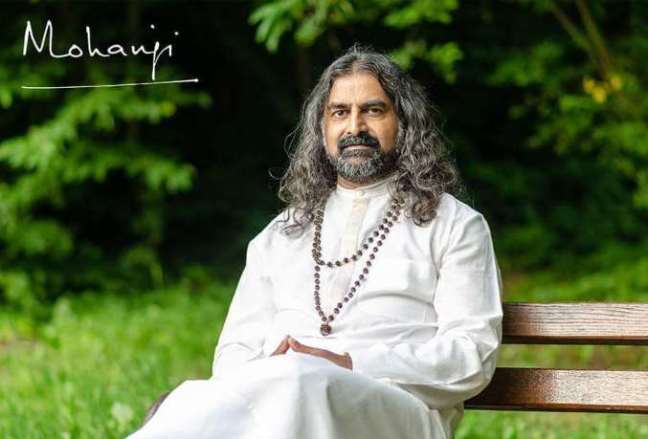
What are we doing through televisions? Talking bad about people. Why do we waste our time? We all have good and bad in us. (We are not perfect, nobody’s perfect, let’s not have an illusion of perfection. We have imperfections; we must have imperfections; we are like this.) But we can nurture the goodness in us. We can nurture the strengths that we have and make them brilliant. Make ourselves brilliant. Life will be worthwhile then. It will be a great life.
Otherwise, we are born, and we die, then how do people know that we existed? Nobody knows. Thousands of people are living and dying. We think that money means everything – money cannot buy happiness. Money sometimes buys anxiety – money sometimes buys fears. So, money cannot buy everything – money cannot buy love.
We have to understand and change the mindset to the level where people should know what life is about and what life is worth. Love is worth it; happiness is worth it.; contentment and peace are worth it. This mad rush for chasing money, chasing pleasures will end to a more refined human existence. Bharat has that source here. We have that thing in India; we already have it. We just need to unearth it, rediscover it again.
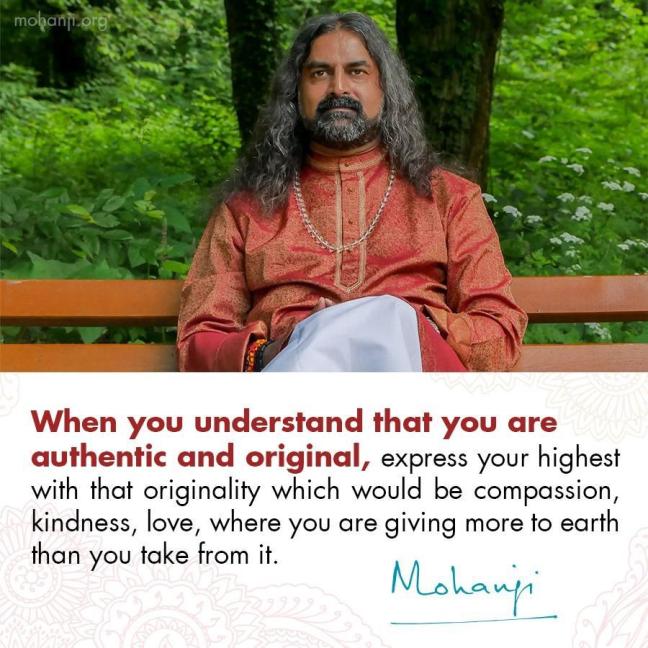
We already have it; it has not gone from here. Through time we have had it. We have experienced it. Great leaders, great ethical rulers, lived here, ruled here. Great rulers – ethical because they believed in equanimity. They were not emotional. Likes and dislikes and habitual, dictatorial attitude were not there. It was always kindness, compassion. “What else can I do for the country? How well can I improve the country? How well can I improve the standards for the people?
We are beginning to have that culture again in Bharat, and that’s exactly what is optimistic about us now. It is really optimistic. It gives a lot of optimism that, of course, Bharat will come back to its original glory. We should. We can!
Sanatana Dharma
Host: Thank you so much, Mohanji. With compassionate visionaries like you, India has lots to be optimistic about. That brings me to my next question Mohanji. Sanatan Dharma has welcomed all traditions. In fact, the golden tradition of the Masters has welcomed all masters, all religions. I have witnessed so many darshans happening through you of Jesus Christ consciousness, of Guru Nanak Ji – you allow everything to happen spontaneously.
So, why is it that today people misunderstand Sanatana Dharma or mix it with a political agenda? When it has been completely open and universal.
Mohanji: Sanatana Dharma is unignorable. What is Sanatan Dharma? It’s the basic ground rules of creation. It’s a basic ground rule of existence. Just like the sun has to rise – it nourishes the Earth, and it also sets at some point in time. That neutral expression of kindness and compassion, the sun, is the prime example.
Imagine; the sun always at noon state on Earth. Earth would be burnt to ashes because we cannot tolerate that, right? Because there is a sunrise and a sunset and equal distribution of energy on Earth. The plants are flourishing; birds, animals and human beings are living here. If the temperature rises or reduces beyond a certain limit, we are all finished.
Sanatana Dharma is like that. The equanimity, the quality, or the balance of existence is Sanatana Dharma. That has numerous dimensions for sure. Like, for example, if you leave nature alone, nature takes care of itself. When human beings withdrew into their own abodes (because of the COVID situation), nature came back to its original state, to some extent.
Sanatana Dharma is not religion
So who is disturbing nature? Human beings. So, Sanatana Dharma has nothing to do with religion. It’s not religion. This is something that you cannot ignore; this is your life. Sanatana Dharma is the way our body is synchronised. Everything, each organ is assisting one other, uniting, connecting to the other. The brain also functions and all of these things are working in harmony and synchronicity.
This is Sanatana Dharma, the basis of creation, how life on Earth works.
Sanatana Dharma is also how the universe maintains itself. Sanatana Dharma means the connection between all of the planets and the satellites. (Imagine the moon is not put in that particular orbit, and it decides to move, up and down, if the moon collides with Earth, what happens?) Moon is set there and is moving in its orbit. Earth is moving in a particular orbit; it’s disciplined.
This is Sanatana Dharma, a ground-rule conducive to life on Earth (or life everywhere), not only on Earth, everywhere.
So, there are numerous lokas (worlds), lokas that we can see and lokas that we cannot see. Some of the planets we can see – but there are so many other things, other lokas/worlds, that we cannot see – human eyes have limitations. All of this put together comes under the jurisdiction of Sanatana Dharma. So it’s not a religion on Earth. Sanatana Dharma cannot be ignored. It’s unignorable.
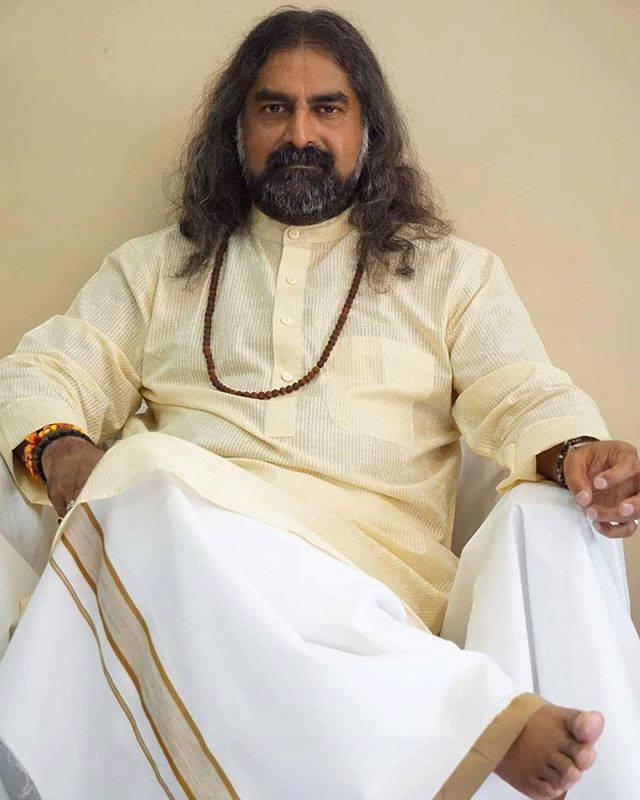
The Hindu way of existence is in tune with Sanatana Dharma. That is why “Survee Bhavantu Sukhinaaha” – “Let all the beings be happy, let all beings have harmony, perfection and happiness.” So, this kind of correlated existence where we don’t disturb anybody (and save ourselves from disturbance as well – for self-protection), but we are not attacking or killing anybody. That’s why Bharat never invaded any country. Bharat never attacked or invaded any country. It never went and looted others wealth because we didn’t need that.
We are self-sufficient. We are happy with what we have.
It doesn’t mean complacency. It’s not complacency; it’s the awareness that whatever you’re supposed to have, whatever you deserve, will fall on your lap; it will come to you. It will reach you. It has to reach you. This awareness is already there, and that makes a person settle.
A Hindu is somebody who’s balanced. You don’t have to chase anything. You don’t have to conquer anything. You don’t have to change into anything. You are fine. Let everybody be happy. Let all people be happy in their own lifestyle or their own ways. That is our culture, our philosophy. This is Sanatana Dharma. This cannot be ignored. I believe that this should happen everywhere. Let all people be happy now, whatever religion. (Religion is usually formed out of a philosophy created by a teacher who understood the truth.)
What is the real truth that you will ever find?
Yourself! What is inside you? Who is the real tenant inside this body? That’s the real truth. Correct? So, we understand, we are not the projected personality, we have somebody who’s projecting this personality, and that’s the real truth. Once we find that, we are self-realised.
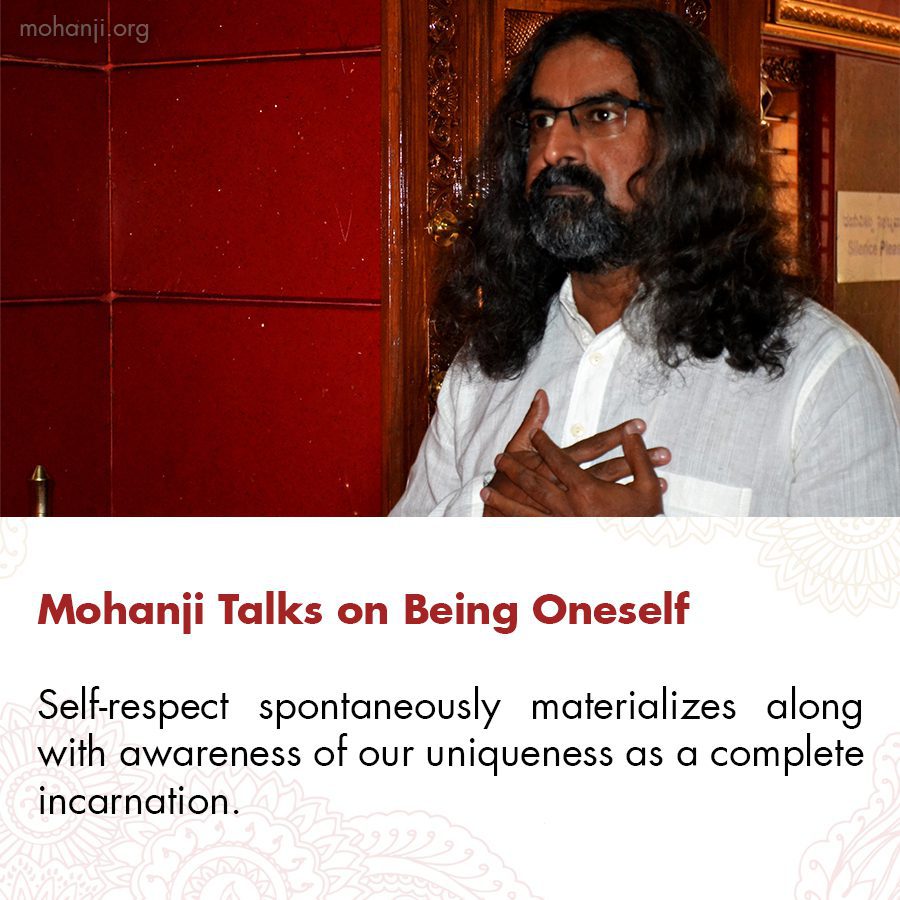
Such people have found methods to reach that understanding, to reach that point. They have found methods, and that created a cult. (It’s not a cult, actually; it’s a following. Cult is usually a negative word because it uses fear to control.) A true path does not need any fear. There’s no need to control anybody, anything. True masters never control people, never use fear to control. So, that’s the true path. A cult usually uses fear to control because there’s insecurity connected to that. We don’t have insecurity; we will never have insecurity. We are confident in the path, we know where we are going, we know the destination, we have found the destination. So, this is good.
Religions are usually concepts or philosophies, created by somebody who had found himself – ‘apparently’ found himself or, thought, he’d found himself – a written philosophy based on his teachings and about certain methods, certain paths. (I will never say “this is wrong, this is right” because this is good for somebody – Let it be.) Sanatana Dharma is a way of life; it is eternal.
But the problem is, when do you experience this religion? Only when you are awake. What happens when you’re sleeping? You go back to Sanatana Dharma – the ground rules of existence. Sanatana Dharma is not a religion; it’s your way of life. It’s you. It’s how you are. Sanatana Dharma is eternal, and it will remain eternal, whether we like it or not.
The mind cannot see unity
But with ‘religions’, it’s like; you wear their shirt, and it suits you, so you wear it. If somebody tries to give you a different shirt (religion), you will say that you don’t need it, it doesn’t suit you. Like that, it’s up to you; to choose a religion or path that suits you. Nobody can deny it. Nobody has the right to say: “This is okay”, “This is not okay”. So, the bottom line is that this confusion is because of the mind; the mind sees differences – as I said, at the beginning. The mind sees differences.
The mind cannot see unity because the mind is not connected to the source. The mind has only connected to the personality called ‘us’. Like, Mohanji is the personality that I have projected into this world. If I believe I am Mohanji, and I start behaving and living Mohanji all the time, I might be suitable to society – but I’m not suitable to me. Why? Because my job is to go beyond this Mohanji and find myself.
I need to live ‘myself’; unadulterated, undistorted, myself, which is the tenant inside this Mohanji. If I have not found this tenant inside this Mohanji, I’m not authentic. I’m just the mind projecting something – whichever I’ve picked up from the world.
That’s not good enough because; when you’re projecting what you’ve acquired, it has limitations. When you have found your source, and you’re not projecting, you’re responding. Like, you have asked the questions, and I’m responding, we didn’t pre-plan it.) I’m responding.
It’s authentic because I’m talking from myself. I’m not trying to project Mohanji on anybody. I don’t have to. If somebody likes me, they will come to me. If they don’t like me, they won’t come to me. Society has only two dimensions: either they accept you or they reject you (usually). Some people say “I love you”, some people say “I don’t like you”. Finished.
Some people who are in the middle are always confused. They can neither like nor dislike because they are unsure. It’s a sign of insecurity. These people are there. That is exactly why we say, “If you depend on your mind and you think you are the projected personality, and you’re struggling to maintain this personality, there will always be pretensions.“
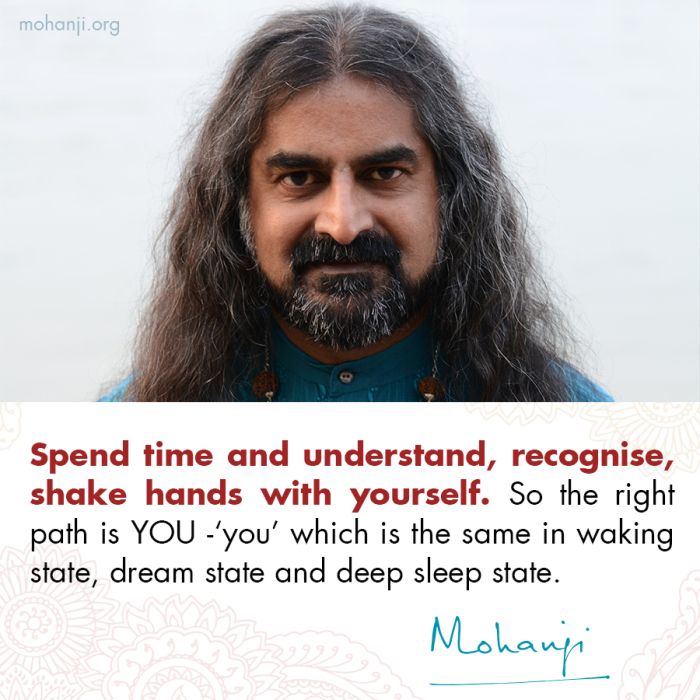
You are the roadmap for yourself; You can never be authentic. Religions are only the dress you wear when you wake up. But there is a deeper you, which you must find out, beyond the religions. Religions are supposedly roadmaps to reach a destination that somebody has reached using that roadmap. But you are the roadmap for yourself. Only you can be the real roadmap to yourself because you are a unique personality.
You can follow somebody’s philosophy because you are tuned to it, like; Bhakti yoga, Gnana yoga, Karma Yoga, Raja Yoga; paths of devotion, knowledge, action or liberation. Take any path; there’s no problem, that’s as per your orientation. This is okay. But, understand, you are choosing the path for your destination, not that the path is important to you. Like; you need a boat to cross the river – but you don’t have to carry the boat on your head after that. This we must always remember.
This is the truth of our philosophy. Nobody says, “Carry the Guru on your head” or “Carry the boat on your head”. Use the boat to cross the river because you need something to cross over. For that, you can use a path, but eventually, you are you.
Actualisation. Realisation, the solution. This is our path.
Great Masters
Host: Mohanji, you have a deep love for saints. It’s very genuine, and you truly love to honour all the saints. I personally witnessed it when I visited you in the ashram, and there was an empty wall, and you suggested that we put pictures of all the Masters of the world, and you also go out of your way to publish blogs and books about a lot of saints.
Where does this deep love come from?
Mohanji: Well, I love all these great teachers, great masters who have accomplished themselves, who have come out of compassion to help humankind. I love them. This love is not cultivated; it is from the heart. I have seen various masters disrespected or unaccepted in society – even Jesus was not accepted during his time. Sai Baba was not accepted during his time.
I like to create a culture of respect. Even I have faced (many times) disrespect or criticism, or these kinds of things, for no reason. I never tell people to come to me. I always tell people: “If you have something better to do, go”. If people come to me, I welcome them. I like to create a culture of respect because that goes a long way in attaining grace. I respect all masters and all of the people who are seekers because they are putting their effort and energy into finding themselves.
Masters who have found themselves; have devoted their time for the sake of society, to guide them. They don’t have to; they have found themselves, they got what they wanted. Why should they waste their time with people who do not care, who ridicule them or criticise them or even crucify them? There’s no need, but they still stay on, they try, and they try so, I like to respect them, and I see myself in them.
Today, if I’m sitting here, it’s mostly because of Shirdi Sai Baba. I would like to say that Babaji moulded me, and I have to express my gratitude. I have written my blog: “Babaji beyond definitions”, about my interaction with Babaji. Is your question connected to my experience with my Masters or?
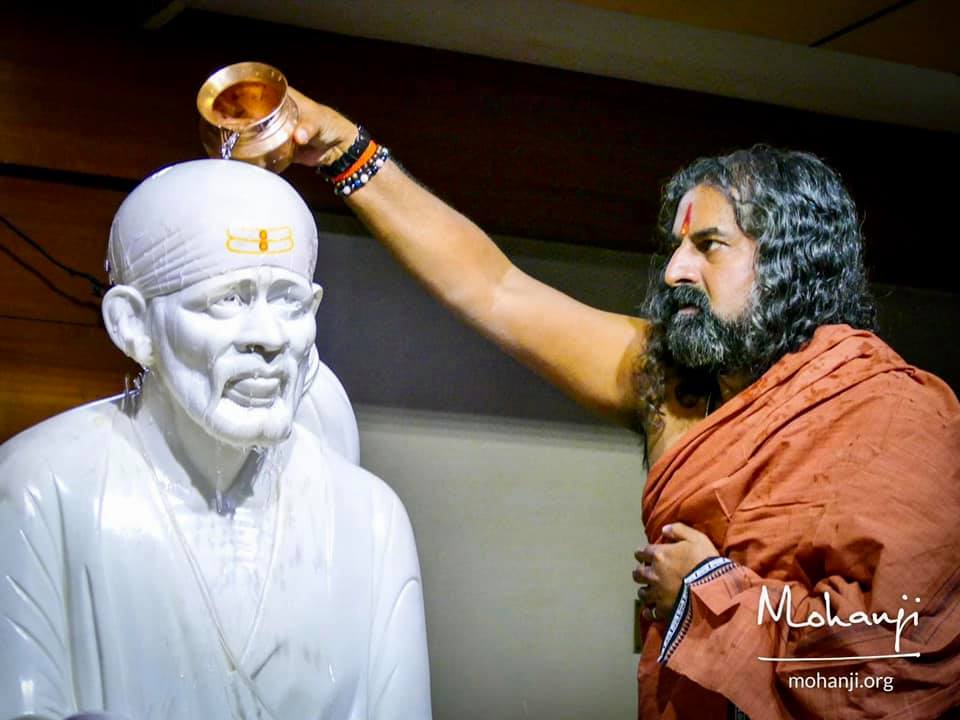
Host: Well, many times, masters of our times are, at least the living masters, they are character assassinated or people, you know, they give, and they give and give. People are very ungrateful, and then, in fact, act very inelegantly later. So, acceptance of the living masters is way tougher in our times. I’ve seen you go through all this. You still completely selflessly keep giving. It does not shake you.
Mohanji: I have not shaken a bit because I have no expectations. I know that some people come, and they are insecure, and they abuse themselves and others. I have nothing to do with that. I try to give them strength and security, but some people do not take it. And secondly, if you have integrity, you will not shake. Our integrity is very important. We must remain rock steady.
This is my advice to all seekers: Be rock steady. Remain steady.
This is essential. Do not go after glitters. Do not go after fancy stuff or some kind of entertainment, like miracles and stuff. Instead, look at your inner transformation. Be rock steady. Remain steady.
I always looked like that. The inner transformation simply means; less thoughts in mind, empty mind. Less thoughts mean; less desires, less inclinations and tendencies. So, this is the benchmark of progress. Not some entertainment, some miracle happening or something else happening. “Did you get transformed?” or “Oh, that’s not good enough.” I would say: “Use that time to find yourself and go within and empty yourself, so you can become the universe. You have the right to become the universe.”
This is my usual advice to all seekers. Don’t fancy these miracles and stuff. They are all nice and fine, but the transformation is the most important thing.

You rightly said that there are people who cannot accept certain things. It could be their own deficiencies or whatever, which they project onto other people. Understand that; In the karmic path, there is no way somebody can inflict something onto you – you deserved it or you created an environment where it happened to you.
So, if somebody criticises me – probably I have created an environment for that criticism to happen. On the other side, if they find happiness in criticising me (whatever they need at the end of the day), if they’re happy, I’m happy. Whatever the reason is, if you’re happy, be happy. For me, it doesn’t matter. I have conviction in what I’m supposed to do, what I have to do on Earth. What I’m doing is that if I am able to give light to somebody, and if that person is able to take that light and use it well, then I’m happy.
This is my happiness. This is my gratification, and for which I have made various platforms: Mohanji Foundation, ACT Foundation, Ammucare, World Consciousness Alliance, Early Birds Club – all these platforms are giving aspiration, inspiration and satisfaction to so many people. This makes me happy.
Now, coming to Masters, as I’ve told you, the whole idea about ‘The Golden Path’ was delivered by Babaji. Babaji has come into my life at various successions, which I have explained in the blog: “Babaji beyond definitions”.
Golden Traditions and Babaji
Secondly, again, Babaji’s hand was evident in my connection with Avadhuta Nadananda. (Babaji is Mahantappa in the Avadhuta tradition.) Mahantappa directed me to Avadhuta Nadananda and told Him: “I have sent Mohanji to you.” (Later on, Avadhuta Nadanada transferred his spiritual bank balance to me.)
This connection happened again – two things I have not written about yet; One time, it was myself, Avadhuta Nadananda and Devi Amma sitting in Devi Amma’s house in Bangalore. At one point in time, we were discussing some matters when Devi Amma said, “Okay, Let’s get up”. We got up, and I was asked to hold the hand of Avadhuta Nadananda, so we held hands, and Devi Amma put her hand on top of our hands. Suddenly, Babaji came, and he put his hand on top of all our hands. This was a real blessing and confirmation that we are on the right path. This was evident because of that appearance – he works in silence, he doesn’t talk.
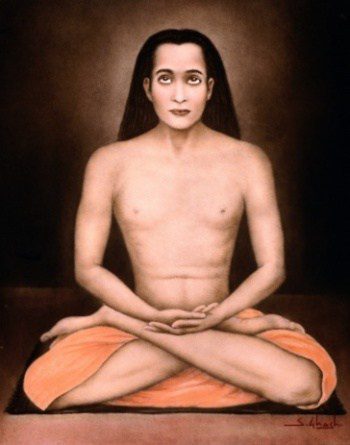
The communion that I had (about seven hours) where he explained the depths of the Golden Tradition, was a time when he actually communicated with me, in that way – again, it was not verbal, it was like telepathic communication, but I got all the ideas, all the understanding.
I couldn’t write anything down because when somebody like that speaks to you, you are like, paralysed, you can’t even move a finger. So, another time it happened, I was about to embark on a journey, and again, I was sitting with Devi Amma, and Devi Amma said, “Mohanji, there are so many jealousies or turbulences, as I see, on your way, be careful.”
So I told Devi Amma, “Devi Amma, I cannot change anything. I have my plans; I have to go. Whatever happens, I’ll take it. I’m used to enduring all this. I have had numerous betrayals in my life, and I’ve seen all of this, so I will go. I keep going.”
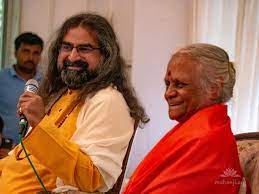
Suddenly, Babaji again appeared, and he pointed his finger towards the box sitting on the pedestal, on the altar, and Vibhuti fell into it, the ash, sacred ash, filled into it. Devi Amma said, “That’s for you to carry; you apply that so you’ll be protected.” I said, “Thank you very much”, and she gave this to me on a piece of paper (she unloaded that ash onto a piece of paper).
Then I asked Devi Amma: “How many months should I use it?” She replied: “He said until October (now it’s January), so for 10 or 12 months”. I said: “What are you talking about, this much, for ten months?! It will not last for one month.” Then (the box was kept back on the altar), the box once again, was filled with Vibhuti. She gave it to me, and it was sufficient for that amount of time.
Intervention and support
So, again, Babaji intervened and supported. This is what I mean to say:
“It’s not my call. It’s not; how, who I am or how I connect. It’s about their love, unfailing love.” They have love for everybody. If I’m not doing something good in the world, they will not support me. Because what will they support for? If I’m selfish, if I am unkind, or I am not compassionate, they will not support me. I must work for the truth, the highest truth of human existence.
Likewise, Shirdi Sai Baba, at every point in time, whenever I had a crisis or whenever there was a problem, whenever I could not move further – he opened the doors – every time, each time.
And it so happens, (you’ll need a few episodes to talk) I will not give all those details, but I would say that whenever I thought: “Okay, now that’s it, I can’t do this anymore”, Baba comes, Baba opens the door. (Of course, I’ve spoken about him physically meeting me – I think that’s also written in my blog.) So, physically meeting me was a transformation. That was a time when I shifted. A big shift happened. So likewise, his presence has always been there.
If Mohanji is sitting here today, it is because of Sai Baba as well. Then, Bhagwan Nityananda. I never knew about him, but when I was writing a blog, I just wrote, without knowing: “Because he set foot on Earth, Earth became better”. Because he walked this Earth, the Earth is better. Then various lineages came to me.
The Lineage of Masters
One is, of course, Avadhuta Nadananda (His Guru was Tara Mai Mother and her guru was Bhagawan Nityananda). Avadhuta Nadananda transferred all his spiritual bank balance to me – that is one lineage.
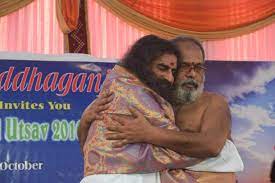
Another lineage is Rakhadi Baba (he was also a disciple of Bhagawan Nityananda), and his disciple was Swami Poorananda. Before Poorananda left his body, he left his Mala – the Mala, that he was using (He left his body on April 6th, 2000) and left this Mala with his disciple. (14 years later, that Mala came to me.)
So Poorananda had said: “One day, you will meet Mohanji and hand this over to him.” So, the disciple had asked: “How would I recognise him?” Poorananda said: “Look into his third eye, you will know. You will see the rising sun.” He recognised me. He handed over the Mala to me. (Again, the Nityananda Tradition coming in.) Likewise, I can say, so many places, like I was at Nityananda’s place in Kanhangad, I was received well, it was such a beautiful experience, a good programme. Like that, there’s a deep connection.
(Now, we are looking at the land near Ganeshpuri; most probably, we will have space there. So, all of these connections with various masters.)
Now I will tell you about Vittal Babaji. Vittal Babaji was a powerhouse. I met him on December 19th 2012, in Hyderabad. (December 21st 2012, was supposedly the day a shift started – a shift of consciousness. I met him two days before.) I had no idea who he was.
I visited that place, and when I met him, he looked at me, and he said: “Oh, precious diamond. Come, sit next to me.” (Normally, a pontiff never allows anybody to sit next to him because you either sit behind him or in front of him and on the floor.) So I said: “No, Babaji. I will sit on the floor.” He said: “No, you sit here”, and then he declared to the people: “He is equal to me.” Then he removed this ring and gave it to me. I still wear it. That’s the time when he gave me the title “Raja Rishi, Raja Yogi “. That was my first title.
Then I met Baba Ganeshananda Giri in 2015 in Shirdi. He was a direct disciple of Shirdi Sai Baba – he was with him – he lived with Shirdi Sai Baba. He was born in India in 1911. Baba left in 1918, so, for a few years as a small boy, he was with Shirdi Sai Baba. Baba used to speak to him every day. I only knew him for about four months, but that four months are like ages – so much love, so much connection. He talked to me almost every day. We got connected, and when he set up his trust, Baba told him: “Mohanji should be part of it.”
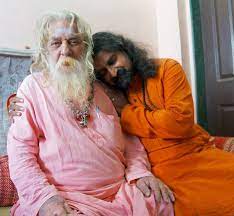
So I told Baba Ganeshananda Giri: “Babaji, with due respects, I don’t live in India most of the time, so please let me hold a position where I don’t have to come and sign all the time.” So, he gave me a Chief Advisor position. Like that, with Ganeshananda Giri’s presence (there is a lot to say), we now have the book: ‘The boy who walked with Sai Baba’. The book tells about his – and our connection with him, as well.
Then I met one master called Lamperi Babaji. (Satya Sai Baba has told people who came from Lamperi to see him, “You want to see God. Go back to Lamperi, go back, home.”) That man is a powerhouse, a very, very powerful man. People are afraid of him. He’s got a stick; he beats people. He does not like to meet saints; he said: “All are faking” and stuff like that. But he asked me to come and meet him. I went, and I was afraid actually, because he is very, very powerful (and is still there), a powerful master, nobody really knows his age (I think). But he really embraced me and was very, very kind, and he gave me a shawl and dry fruits.
So there’s been numerous people liking me and giving me all sorts of things – I have so many more of those connections that I will talk about some other time. But the point I’m making is: “If your path is good, if your work is proper, you will receive support”.
I asked Devi Amma (when I had huge attacks on me from various levels): “Am I doing the right thing or the wrong thing? Should I stop what I’m doing?” She said she would speak to Agastya. Agastya told her: “He’s my son. I like his job; I like his work. I like what he’s doing, and I will support him.” I have support from; Agastya, Boganathar (from all these masters), Vittal Babaji, Avadhuta Nadananda, Devi Amma, Vanamali Amma, Baba Ganeshananda Giri, Lamperi Babaji, to name a few.
There are numerous masters – they are all selfless. They don’t ask you for anything; you do not have to give them anything. There’s no transaction here. There’s only solidarity. That’s the beauty of our Bharat. We do not look at what we get. We give what we have. There is your strength.
If you’re able to deliver what you have, without looking at what you get, imagine how powerful you are. Why do we become weak? Because we think: “What are we going to get? What’s coming to me?” That makes you weak. That makes you like a slave. But here you’re not thinking of gaining anything – “Okay, what I have, I give to you, take whatever you want to take – so that you’re free.” They are free. The relationship is beautiful. Unconditional. This is the beauty.
Host: Thank you so much, Mohanji.
I hope you like this interview. If you have questions to ask Mohanji, please write them in the comment section below. I will try to ask him in my next interview.
Transcribed by Ulla Berhnholdt
Proofread by Cathy Johnston

